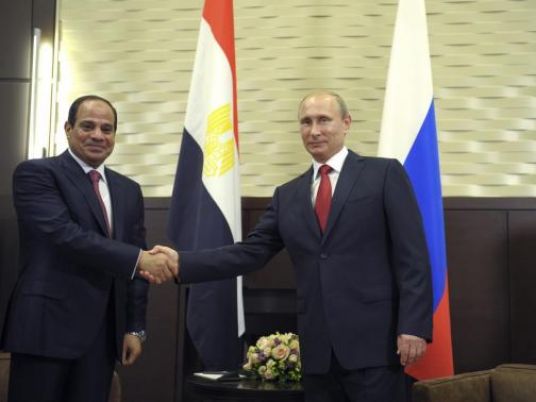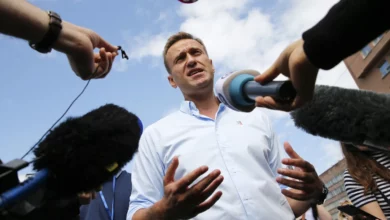
According to the recent statements by the Egyptian authorities, Egypt intends to establish a free trade zone with the Eurasian Economic Union (EEU), comprising Russia, Kazakhstan, Belarus and Armenia, by the end of 2016.
The deal had already been discussed in February during Russian President Vladimir Putin’s visit to Cairo, after which Egypt sent an official request and began negotiating the agreement.
The headlines speaking of Egypt joining the Russia-led EEU are, however, misleading, since the negotiations do not foresee applying for a full membership of the organization, but rather establishing a trade agreement similar to the ones already concluded by the EEU with India and Vietnam.
The EEU, which officially began January 1 this year, is the last of many Russian-sponsored efforts of Eurasian integration, aimed at bringing the 15 former Soviet nations back together.
The Commonwealth of Independent States (CIS), an early attempt toward the goal, currently comprises nine members: Armenia, Azerbaijan, Belarus, Kazakhstan, Kyrgyzstan, Moldova, Russia, Tajikistan, Ukraine and Uzbekistan in addition to one participating state (Ukraine) and one associate state (Turkmenistan), after Georgia withdrew in August 2008. It was created in December 1991, shortly after the fall of the Soviet Union, to which it was meant to be a successor entity.
The second integration attempt, the Eurasian Economic Community (EAEC or EurAsEC) was initially suggested by Kazakhstan's president, Nursultan Nazarbayev in 1994. It eventually originated from the CIS in 2000, when the leaders of Belarus, Kazakhstan, Kyrgyzstan, Russia and Tajikistan signed its founding treaty in Astana. The pact, aimed at providing an economic counterweight to the European Union, involved a number of similar measures, including freedom of movement without visa requirements among the members, a common economic space, a customs union and the Eurasian Economic Commission as the regulatory agency. The organization, which did not succeed in implementing the economic harmonization it planned to achieve, was merged into the EEU in January 2015.
The EEU, much like the its European counterpart is gradually introducing the free movement of goods, capital, services and people, providing for common policies in the areas of energy and agriculture, as well as a possibility of introducing a single currency and a level of political integration in the future. Also the supranational and intergovernmental institutions such as the executive Eurasian Commission, the Court of the EEU and the Eurasian Development Bank aim to match EU's supranational bodies, in the addition to the Collective Security Treaty Organization, a defense alliance.
According to Vladimir Putin's statements, the organization should ideally become an equal of the EU and other large supranational enities, a powerful bloc able to exert its influence on the world stage. As he said in 2011, the EEU can draw on the experience of the EU and other regional associations, by seeing and reassessing their strengths and weaknesses. "This is our obvious advantage since it means we are in a position to avoid mistakes and unnecessary bureaucratic superstructures," he added.
However, according to critics, the idea of a universally beneficial integration of all post-Soviet states is a mere façade, as the vast economic disparities among the organization’s members are likely to be solely in Russia’s favor, given that its economy, in spite of the recent crisis, remains disproportinately larger and more powerful than any other country within the organization, comprising over 80 percent of the bloc’s GDP and a similar percentage of its population. This has led Western observers to conclude that the Union, rather than providing a common space for development and political integration similar to the EU, is simply Russia's attempt to expand its influence in Asia, bringing it back to the superpower status it enjoyed prior to 1991, and relegating all other members to secondary roles. It is perhaps due to this disparity that former Soviet states maintain strong commercial links with the EU and China.
Even before the organization was launched, major differences between its members began to appear, and Ukraine withdrew from the project in 2014. Customs disputes between Belarus and Russia, Kazakhstan and Armenia continue, and as Russia’s economy goes deeper into crisis, the prognosis for 2015 is pessimistic. “Without Ukraine, Russia ceases to be a Eurasian empire,” the former US security adviser Zbigniew Brzezinski wrote in 1997, explaining the ongoing attempts by Russia to regain its full control over the renegate state. After the Euromaidan protests and the ouster of the pro-Russian president Viktor Yanukovich, Moscow retaliated by restricting trade with Ukraine, then annexed Crimea, moving on to financing and fomenting a destructive separatist movement in its eastern part.
At the same time, due to the other EEU member's cautious approach to a stronger level of integration, Russia's former plans for a Eurasian parliament, a Eurasian passport, and a common Eurasian currency seem increasingly less likely to ever become reality. Also, in spite of repeated Russian attempts to extend its influence over the three Baltic states, neither Lithuania, nor Latvia, nor Estonia have sought membership of any of the post-Soviet organizations, achieving membership of the European Union and NATO instead.
Egypt's trade agreement with the EEU would ideally give it preferential access to the integrated single market of 176 million people and a GDP of over US$4 trillion. A Russian industrial zone near the Suez Canal and a number of other joint projects in the areas of transport, manufacturing, and energy are on the table, and the upcoming free trade agreement, expanding the scope of cooperation, would undoubtedly contribute to increasing EEU's influence, as Russia attempts to build more diplomatic ties on the international stage, counterweighing the impact of EU's economic sanctions and its increased isolation following the conflict in Ukraine.




